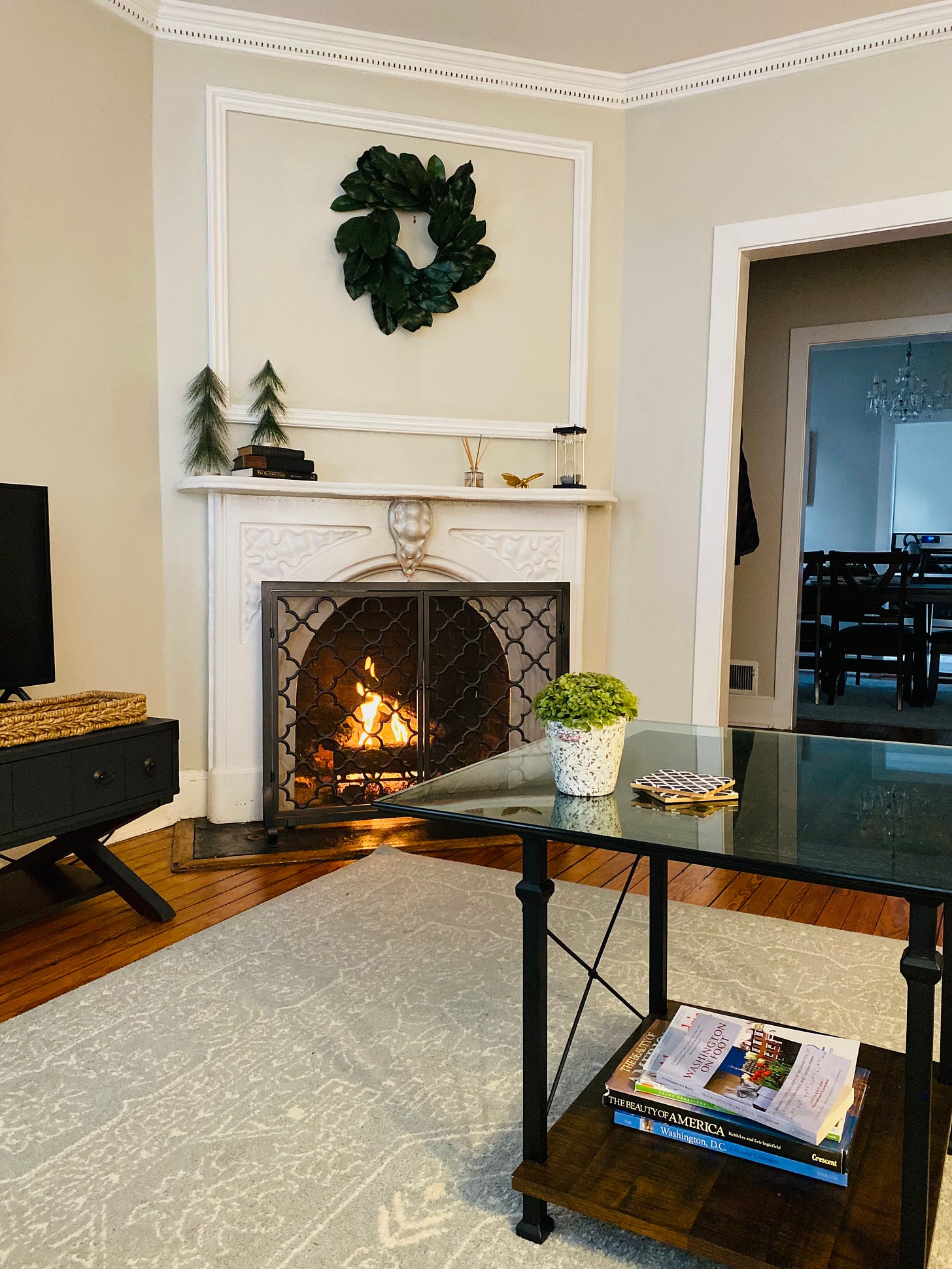Seeing Beyond the Good Parts
Befriending midlife — crisis and all, changes at 40, responding compassionately to heartache, and getting the groove back.
O Lord, you know all about this. Do not stay silent. Do not abandon me now, O Lord.
Psalm 35:22, NLT
Who ordered the midlife crisis?
I remember thinking it a silly question when asked around my adolescent birthdays, “Do you feel older now?” Uhhh, why on earth would I feel different overnight? Waking up as a 10-year-old felt exactly the same as falling asleep as a 9-year-old the night before, am I right? Actually, none of my decade birthdays left me feeling any different, at least not until my fourth one.
In my 38th year, I gradually noticed a few changes in how my body felt and the arrival of fine lines, but I chalked them up to the adjustments we all made for the pandemic. Thirty-nine was mostly spent catching up on travel, attending trainings and classes, helping my oldest move to another state, and starting a new job.
Every single day of every month had something going on, so I easily dismissed the nagging ache growing in my soul. Journaling took a back burner that year, and what I did write reeked of avoidance. I have a long history of hiding from discomfort like the plague.
In October of that year, a few trusted friends helped me wake up by gently asking “how are you really doing?”— and listening patiently to my response. When I read the following quote at the end of the month, I knew I had to stop distracting myself with flyby platitudes and face the music (I’m pretty sure it was melancholy violin).
“Experientially, the inner healing of the heart is seldom a sudden catharsis or an instant liberation from bitterness, anger, resentment, or hatred. More often it is a gentle growing into oneness with the Crucified who has achieved our peace through His blood on the cross. This may take considerable time because the memories are still so vivid and the hurt is still so deep. But it will happen.”
— Brennan Manning, Abba’s Child
A midlife crisis has to do with identity. Time is flying by and the mind hyper focuses on life’s meaning and purpose. During the year leading up to my 40th, I started questioning: What have I done with my life? I thought I would have [so many things] figured out by now. Is this it? Why am I so angry? How did I get here? What if it doesn’t get better than this? Do I even know who I am anymore? Did I ever? Thoughts like these can fester if they stay buried and lead to unusual behaviors — like buying a car you can’t afford, or deciding the grass is greener in someone else’s house.
Life kept its frenetic pace, but the “healing of the heart” I read about continued to beckon me forward from a distance. I was pretty sure I wanted the life I had. I just needed to figure out how to do it better, and that meant getting comfortable with being uncomfortable. {{{groan}}}
Decade number four
For my 40th, a couple girlfriends and I cozied up at a charming Airbnb in Old Town Alexandria. I woke up with the sunrise the morning of my birthday and tiptoed downstairs to make coffee and light the fireplace. Staring at the flames, coffee warming my hands, something unexpected occurred to me.
I feel different.
I felt a sense of accepting who I had become without resistance. In that moment, I was genuinely relaxed for the first time in years, and I could only attribute my tranquility to waking up as a 40-year-old. It finally happened! My 10-year-old self would be so jelly.
We hosted a dinner later that evening with a few more pals. After the meal, my friends took turns sharing something meaningful about me and then they prayed for me. One read Psalm 40 aloud as her prayer, and tears streamed down my face. The words seemed to be describing my life in detail, sinking in deep to soothe my spirit. I still read Psalm 40 often: thanksgiving and a cry for help.
Now that a few years have passed, the most notable shift as a 40-something is my ability to brush things off more quickly and come back to the present, warts and all. We will attribute that development to a “gentle growing into oneness with the Crucified” like Manning wrote. God did not abandon me, and He provided help and encouragement through people who joined me in a long, dark season.
The simplicity of compassion
Having peace is a deep desire of mine, and I want those around me to experience peace as well. Consequently, I do my best to reduce discomfort, whether it’s my own or someone else’s. Depending on the approach, being involved with another’s suffering can be emotionally taxing, but I’ve learned that my presence alone is often the most helpful offering I can give.
Chances are, you are either currently in a crisis, know someone who is, or will encounter one soon. That’s life, right? One of the best explanations I’ve found on how to offer genuine compassionate support is from Brené Brown. In this video she explains the stark contrast between empathy and sympathy.
Maybe you want so badly to ease a loved one’s pain. Or perhaps their pain causes you discomfort, so solving their problem would be a win/win! Suffering may be a part of life, but it’s never jolly or convenient. And having someone bypass your pain to remind you of all your blessings isn’t going to make the anguish disappear. Is there always good present? Absolutely, because we were created by a loving, holy, compassionate God. Do we need help seeing where grace is present when darkness seems to blot out all the goodness? At the right time, definitely.
Jesus actively participated in people’s sorrow despite knowing better days were coming. He never sidestepped grief in his care for human hearts (see John 11:1-44). So for us, the simplicity is we don’t have to heal the hurt or have a brilliant answer. Just showing up and sitting in silence — like Job’s friends before they started sharing their opinions — is one of the most compassionate ways to soothe a wounded soul. This doesn’t mean we won’t be impacted by heartbreak, but there’s no pressure to make it all better. We cannot produce change, but I am confident the Lord is on the job, full of pity, love, and power.1
Spurgeon writes about God’s Fatherly pity in Psalm 103:13:
…he knows your trials will work for your good, yet he pities you. Though he knows that there is sin in you, which, perhaps, may require this rough discipline ere you be sanctified, yet he pities you. Though he can hear the music of heaven, the songs and glees that will ultimately come of your present sighs and griefs, yet still he pities those groans and wails of yours; for “He doth not afflict willingly nor grieve the children of men.” In all our distresses and present griefs he takes his share; he pities us as a father pities his children.2
Above all, God intimately knows the good parts in our lives, and still He shows compassion when we groan. As we experience His tenderness, we can confidently share comfort with others in need (see 2 Corinthians 1:3-5).
Embracing the groove
Some days feel like this…
…while other days look like this:
The more stressful times of life are not without benefit, though I think the carefree days are way more fun. I mean come on; I’m no glutton for pain. Still, pressure can ultimately enhance our lives just like it does in creation — pressure makes diamonds and pumps blood through our bodies. Feeling dread, fear, and weariness is natural when a hard season seems to overstay its welcome. So what do we do with those emotions?
Let it out. Talk to a friend. Bring it into the light.
And like the psalmist, tell/write/blubber your worries, doubts, anxieties, and fears to God who gives mercy and grace to help in times of need (Hebrews 4:16). Cry for help. He will answer.
Extras
Music, reading, tasty food, and a notable moment.
The tunes
In the spirit of keeping the groove through highs and lows, I give you my “this is fine” playlist. Cover photo by the very indie Anna Jones.
The read
This week I’m passing along an article I saved to my Reading List back in May. I think you’ll find it complimentary to the topic.
12 Easy Ways to Improve Your Listening
The menu
When I’m missing my friend Rebecca and want to feel like I’m back in her kitchen, I make this Korean Beef Bowl by Damn Delicious. I let the meat simmer on medium low for longer than the recipe suggests to get it crispier and caramelized. YUM. I also swap out the ground ginger for fresh because the flavor is superior IMO. Did you know you can store fresh ginger in the freezer and just grate the unpeeled root from frozen? I always have some on hand now and it doesn’t spoil. Revolutionary! I served the beef over jasmine rice and had a side of streamed broccoli, but you could add any veggies you like.
The moment
The front and back of our house faces north and south respectively, so I can’t see the morning or evening sun from the porch or deck. I finally walked up the hill Saturday morning to watch the sunrise; it did not disappoint.
Be well, friends.
From the hymn Come Ye Sinners.
https://www.spurgeon.org/resource-library/sermons/gods-fatherly-pity/#flipbook/.











You know I’m a puddle reading this—so good. As someone who has experienced your ministry of presence, I say it’s this line for me: “So for us, the simplicity is we don’t have to heal the hurt or have a brilliant answer. Just showing up and sitting in silence — like Job’s friends before they started sharing their opinions — is one of the most compassionate ways to soothe a wounded soul.” YES and AMEN.
I love this!!! .so. much! You captured do mich heart and hard and hurt and healing beautifully ❤️